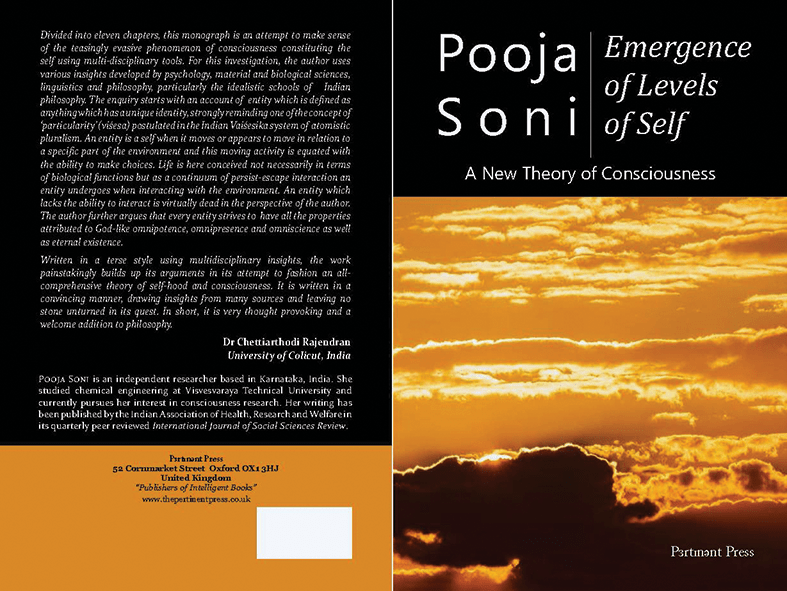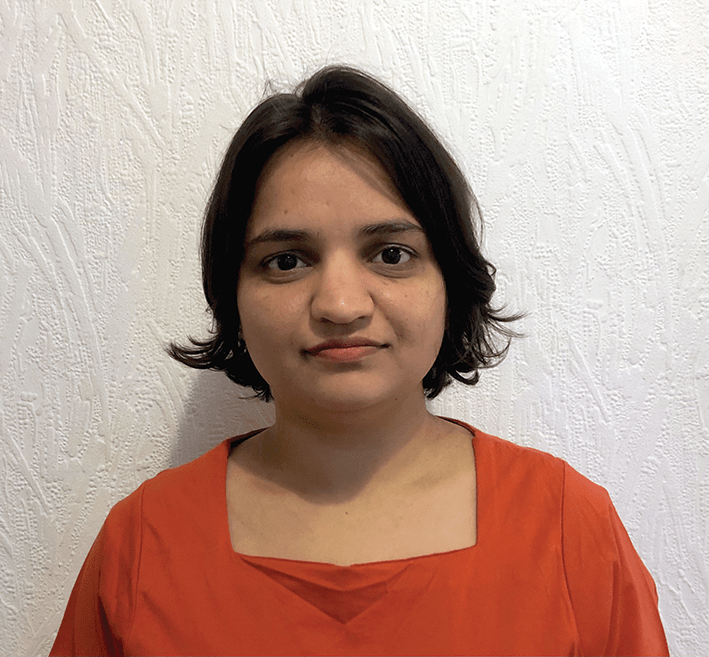KU MA philosophy student, Pooja Soni, shares her experience as a published author of her book Emergence of Levels of Self: A New Theory of Consciousness and reveals what she is working on now.

Can you tell us what your book is about?
“My first book is about a new theory of consciousness,” Soni said. “It basically explains self as a self in everything; even a chair can be a self of a certain level. A rock can be a self. Even money can be a self. So, in that sense, the idea of self that I put forward is pretty logical.
“It’s like saying if Aristotle’s Soul, Immanuel Kant’s Synthetic Unity of Apperception, Fichte and Schelling’s self-consciousness, and Spinoza’s God are put together, you could possibly get a theory of self which applies for everything that exists, and my theory is that,” Soni explained.
Were there any philosophers or psychologists in particular who you used as reference?
“The theory focuses mainly on the impact of emotions and I would pretty much say it is an attack on hedonism,” Soni said. “I provide logical reasons, of course, to believe that happiness and sadness could be treated on the same plane if we focus on micro-expressions, that is, facial expressions, according to the work of psychologist Paul Ekman.
“Since my theory of self incorporates the theory of language and how language is learnt, my work is also related to Wittgenstein, Piaget and Noam Chomsky’s ideas of languages and their relationship with faculties of minds.
“So, essentially, my book is about an embryo growing, developing and attaining new levels of knowledge and new faculties of mind, as well as learning how to use language,” Soni said. “In particular, it’s a theory that says you start with the ‘I’ and you are the ‘I’ first, and then you become one with the environment when you interact with it.
“When you become one with the environment, the environment around you becomes self and those selfs try to control your actions.”

Who would your book be most relevant to?
“My work would be relevant to present day philosophers like David Chalmers,” Soni said. “Chalmers recently wrote a short paper about the meta-problem of consciousness and he expounds on this problem of explaining how anyone can start asking questions, such as why consciousness exists, why god exists; the why questions.
“Andy Clark’s work on the extended mind is also incorporated and Antonio Damasio’s theory of emotions. I take a lot of inspiration from his work as well but I’m not sure if I do justice to his work.
“The purpose behind writing this book is that I have always been fascinated by the idea of self and identity and who we are,” Soni said. “I was more interested in exploring the self from within as compared to the outside, which religion does for you.”
On that note, what else influenced or inspired you to write your book?
“My personal struggles with depression also inspired me to look at the questions about the self, mind and body problem in a critical way because I see that you might be suffering from the inside, but the social implications of your suffering are seen to impact you differently,” Soni revealed.
“The suffering from inside is not the same as suffering as it appears on the outside, which is a huge problem in curing mental illnesses in society in general.” Soni said. “This is because, when a person is depressed, they may not feel that the discomfort is too much.
“However, when their state is interpreted by people in the outside world or society through organisations, the severity multiplies and the person is, in a way, forced to believe they are leading an alternate life.
“With sadness you can escape from the real world that is all too-perfect and too-amazing and sadness gives you the opportunity to look at life in a different way. It’s like you used to lead life in an analytical way but sadness brings you to this platform that life could be dialectic; you can explore the new possibilities.”

Did you find the writing process quite cathartic?
“Writing was like therapy,” Soni agreed. “You write something and then you’re done with it, but the next day when you read your ideas, it’s basically the feelings that you feel. You think, is this the person I am? It’s like psycho-analysis, so it does go like that initially.
“To be self-conscious is the best thing and that is why you’re asked to exercise when you’re depressed and do self-conscious activities, such as observing yourself from the outside, your feelings and emotions as they arise and so forth.
“So yeah, writing really felt like therapy and it opened my mind up to the vulnerabilities that we have within ourselves as humans,” Soni said.

I heard you are in the process of writing another book. What is this one going to be about and when do you think you will have it published?
“My other book, which will be a self-help book, should be out in March,” Soni said. “If you’re not a fan of hedonism and you’re open to the idea that sadness could be good, self-consciousness is needed and if you are interested in knowing how the senses behave when you are going through emotions, then you might be interested in my book.
“It will basically answer questions like, how can I understand happiness without sadness? Is evil independent of good? Does my mind control my body or does my body control my mind? Is sadness good or bad? What does pleasure look like?”

